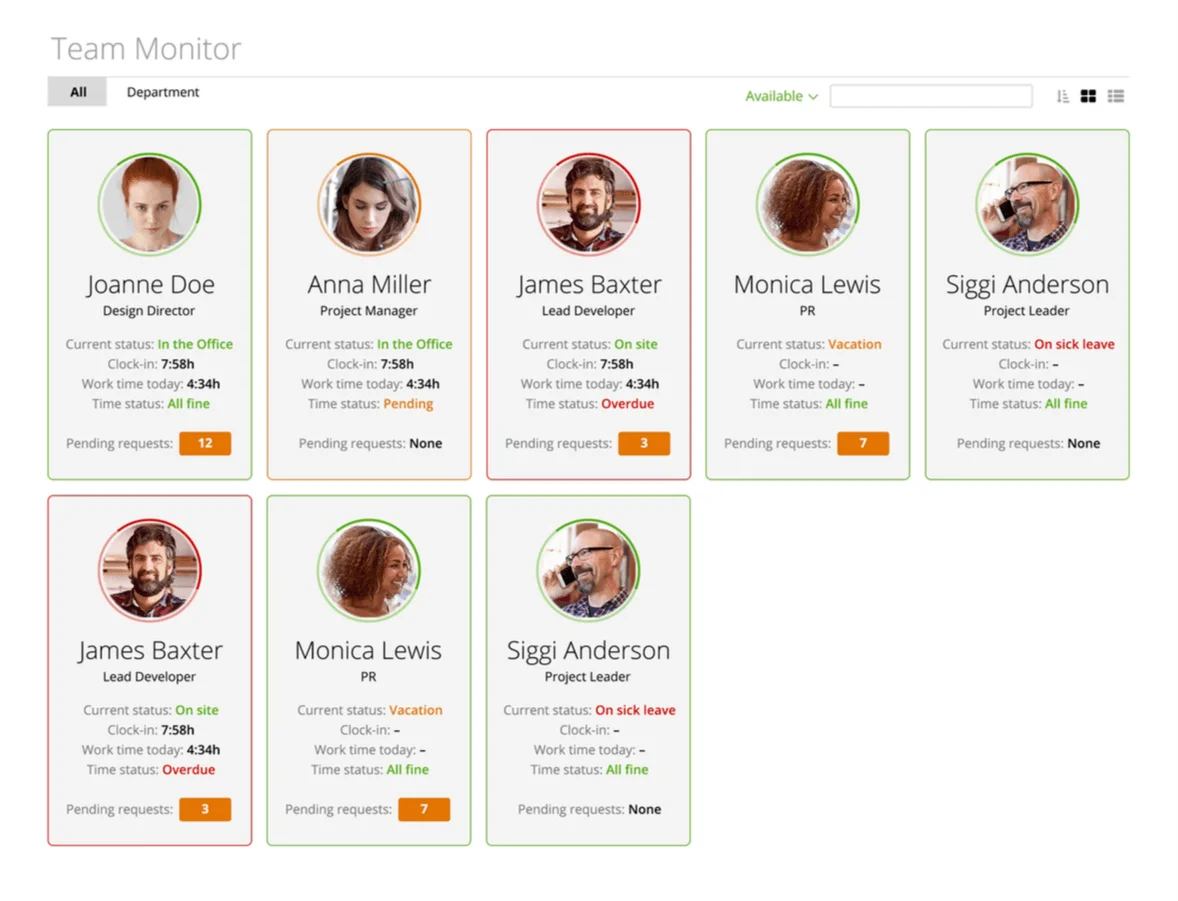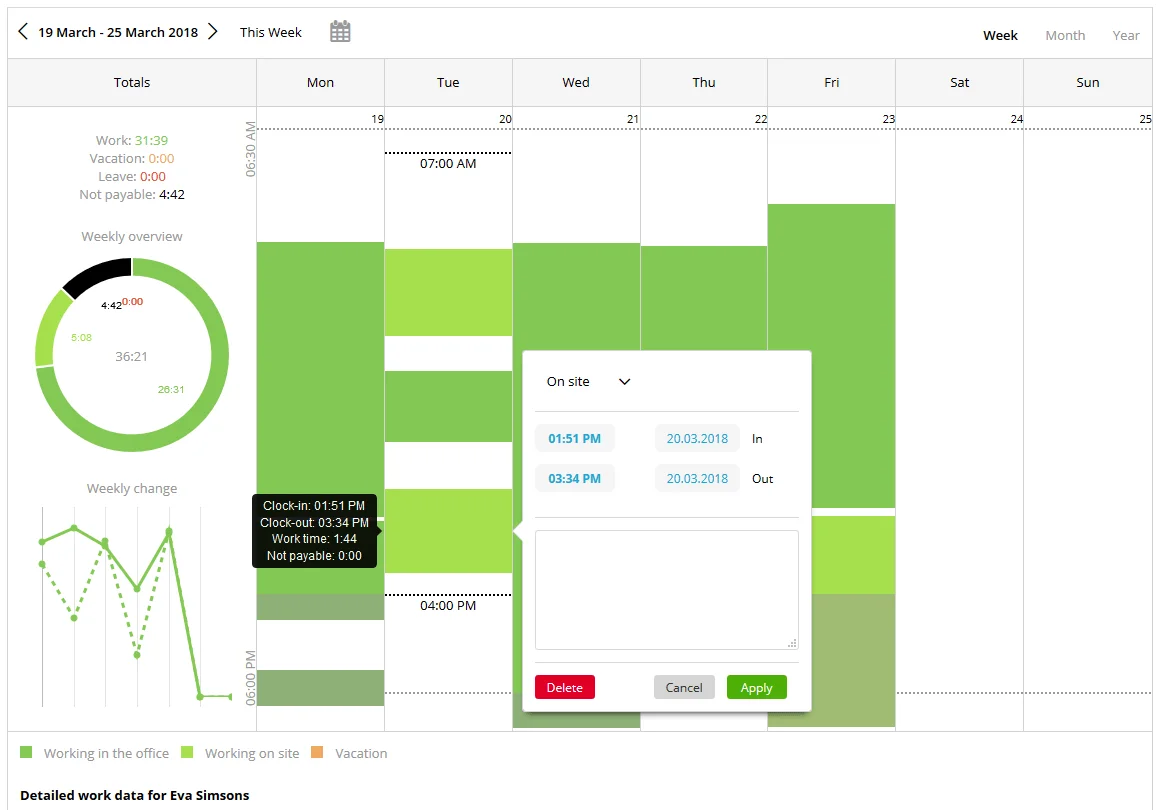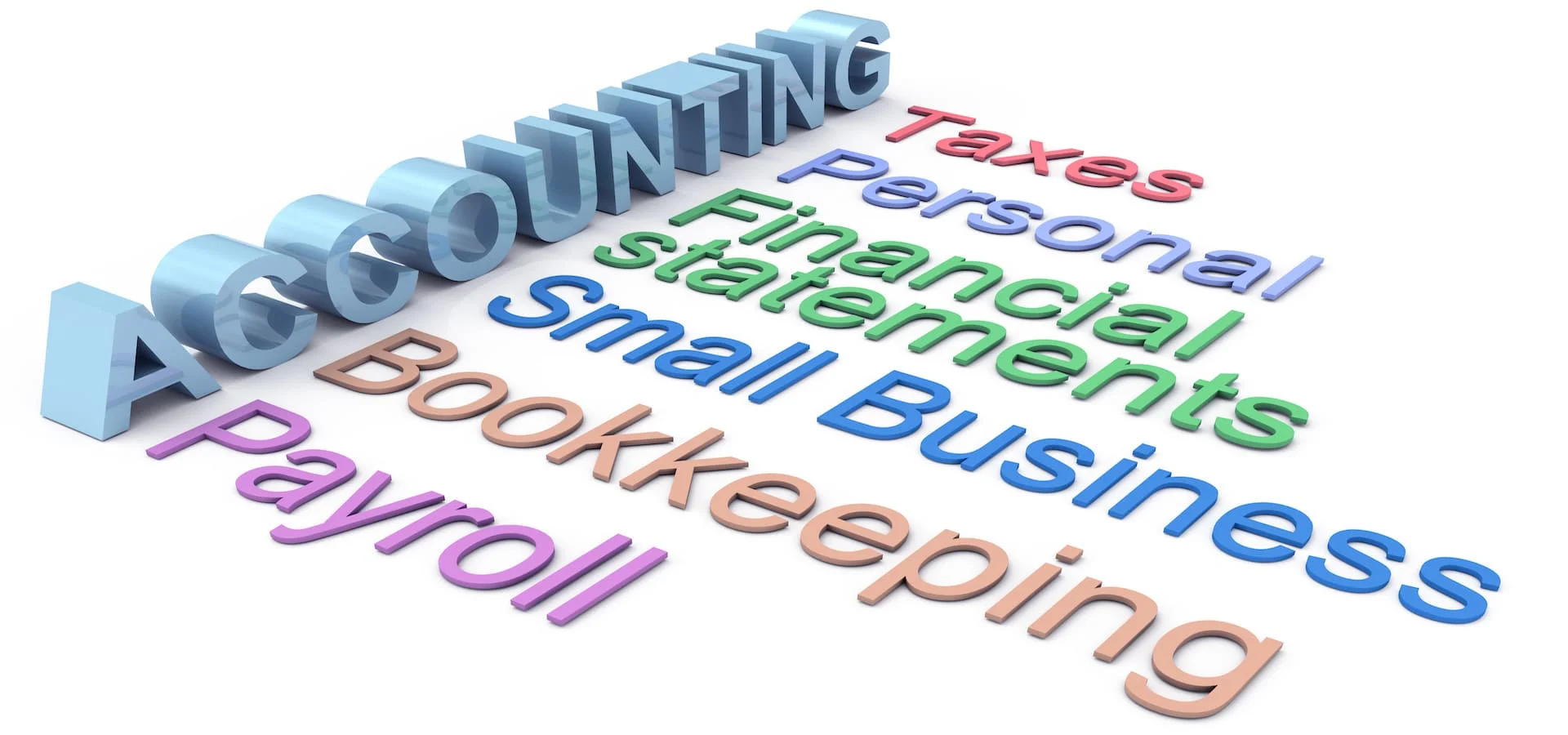If you think about it, time management is not really about managing time at all. It is pretty much about managing yourself and how you prioritize your tasks. After all, we all have 24 hours so how we use the hours is specifically up to us. The better you manage your time, the more you are likely to be more productive in your activities. That’s why today we will discuss more about employee time management to help you take your business or freelance work to the next level. But before that, first things first.
Table of contents
- What is time management?
- Key elements of time management
- Time management strategies
- Benefits of using Employee Time Management Apps
- Time management tips for improving employee performance
- How to manage employees with poor time management skills?
- 4 Methods to improve time management
- How to make Time Management Work?
- Difference Between Time And Task Management
- Time Management Tools
What is time management?
Time management can be defined as planning the available time and controlling the amount of time you decide to spend on specific tasks, to perform more effectively. By doing so, you get to perform your tasks even more efficiently.
Employees or freelancers must make use of their time management skills while accomplishing their activities. Failure to do that can lead to increased stress levels, poor quality work, harming professional reputation, and ruining the work-life balance in a place of work.
If you are looking for the most effective time management strategies, you are in the right place. Allow me to show you just how easy managing time can be.
What are the 5 key elements of employee time management?
Like Benjamin Franklin says, “Time is Money.” Therefore, making the most out of your time can help you stay on top of your work and reach important milestones even faster. Here are a few elements of time management techniques you need to keep in mind.
Hint #1: SET SMART GOALS
The goals should be: specific, measurable, achievable, relevant, and time-bound.
The goals set should be: doable and within the time frame suggested.
-
Goal orientation
Generally, goal orientation is crucial for any employee’s time management. The boss needs to keep the team members in the loop about the company’s goals and help them work towards those goals. It is important to set short-term and long-term goals. Set SMART goals, meaning the goals should be specific, measurable, achievable, relevant, and time-bound. The goals set should be doable and within the time frame suggested.
-
Prioritizing Activities
Effective time management requires you to know the difference between what is most important and what can wait. This is no easy thing to do because many people don’t differentiate between what is most important and what is urgent. For the best results, categorize your tasks into four helpful quadrants, important, not important, urgent, and non-urgent. This will go a long way in helping with the allocation of assignments to your employees. After categorizing your tasks, assign the most urgent tasks to your employees and devise a plan to allocate the not-so-urgent tasks to your employees later. By focusing on the most important activities, the company will gain control over time, and you get to accomplish tasks on time, reducing the number of urgent tasks in the future. It will also help employees to focus on most important tasks.
-
Appropriate Delegation
Successful managers and freelancers recognize that they cannot do it all and should not even try to do it all. Increased employee productivity is realized when team members share work. Also, delegating tasks allows you to focus on the most prioritized tasks and be able to meet the target as well as deal with any missed deadlines. Delegate the duties and communicate your expectations to the members in a way they can all understand.
-
Time Limits
Generally, knowing the due date for each task, setting reasonable deadlines, and working efficiently are vital attributes of effective employee time management. Spending too much time on a specific task can lead to decreased work productivity and profitability which can be detrimental to the interests of the institution. Encourage your employees by giving each task the time limit it deserves. That way they can get enough time to accomplish every task at hand, and on time.
-
Emotional Composure
Effective time managers do not let their fears or anxieties take a toll on them when they work under pressure or tight time constraints. They plan themselves accordingly and ensure they have a way to deal with their fears and anxiety when working. They always ensure to practice effective work-life balance to maintain their attitude as well as their physical health. Always remember that the physical and emotional health of your employees is critical.
What are 4 time management strategies?
Now that you understand the elements you should have in mind to manage time effectively, here are a few time management tips to help manage your time even better:
Keep a to-do list
Keeping a to-do list might not sound like the most innovative idea, but it is actually very helpful. It can help you and your team members with project management. Having a to-do list allows you to set a list of tasks you want to complete first and put the secondary tasks on hold for a while to deal with them later.
Eliminate distractions
It might not seem like it, but distractions are one of the most significant productivity killers. Social media platforms such as TikTok, Facebook, and Twitter can be seriously disruptive. Some employees can be distracted by these platforms for up to three hours a day, reducing productivity in the business. If you notice the phone is taking lots of your time and employees, consider leaving the phone at home. If you keep on using your working computer to get into these sites, consider using an extension to block the sites.
Avoid multitasking
While multitasking might sound like a good idea to get things done, it is not. Instead, what it does is reduce your productivity. Generally, instead of starting and completing projects, you keep on starting and not completing projects. Therefore, the best way to do things is to start a project and only begin another after you are done with the first one.
Use time tracking software
One of the easiest ways to keep track of every minute of your workday is using time tracking software. Such software is designed to estimate the amount of time you should use on a specific task and help you maintain a record of work that has been accomplished in a day. A perfect real-time tracking software you might consider using is Zistemo. It is business-tracking and invoicing software that works in the SaaS business model. It is available in multiple languages, English included.

Benefits of using Employee Time Management App with Time Tracking Functionality
1. Boost your efficiency
Actually, there are enormous benefits of using a time tracking software. According to recent studies, a time tracking software will enhance your efficiency by leaps and bounds. This is because it will make it easier for you to focus on the things that matter the most. With zistemo you get additional benefits. Online time tracker integrated with project management tools, holiday planner, flex time and timesheet approvals make the whole workflow smooth. From tracking time on daily tasks to counting billable hours and calculating payments.
2. Focus on tasks that matter
For big corporations, the employees will be able to manage their time better and eliminate tasks that are not essential at all. A time management software makes it possible for you to analyze the different aspects of your work day. For instance, you might have spent an hour gathering information at the workspace. If you took a break at work, it will easily be reflected on the software. And it will make it easier for you to make amends and focus on things that mater the most.
By adopting the software, it will be quite easy for you to determine the tasks that took more time than was planned and hence introduce changes. This might be essential especially where you want to adopt an effective work life balance. A break is always important for you since it will allow you more time to recharge. If you want to understand the areas that you have to improve at the workplace, it is a good idea to consider purchasing a time tracking software.
3. Detailed performance overview
For big companies, a time tracking software can come in handy. They will have a reliable way to assessing the performances of the different employees and hence discern the most competent ones. This will go a long way in enabling such a company to retain the top performers. Ant thanks to that become more efficient and profitable. One of the main reasons why most modern companies fail is that they make decisions based on unverified data. This means that they may end up losing some of the most productive employees and hence lose their edge over time.
There is a high number of time tracking software in the market today. You should do your research well to establish the one that has been tried and tested. When it comes to a time tracking software, you do not want to make costly mistakes.
4. Less time for calculating payrolls
For small business owners and team leaders time tracking tools mean less time spent on calculating payrolls, and more time for managing their team. Are a small business owner? zistemo will help you with the whole business management. We cover all. Issuing invoices, payment reminders, professional invoice templates, flex time models, holiday management and tracking work hours of all your employees on 1 place.

What are the best time management tips for employees?
Here are some time management tips that can help improve your employees’ time management, reduce work burnout and improve performance
- Give your team members breaks such as coffee breaks and lunch breaks.
- Reward the employees for managing their time effectively and producing good work.
- Delegate duties to the right people so that everyone can be in the areas they perform best.
- Encourage employees to set goals amongst themselves.
- Give employees more freedom on how they use their time to get tasks done.
- Consider giving the employees flexible schedules.
- Provide time management training to the employees.
How do you manage an employee with poor time management?
First, you need to determine why you believe the individual is “poor” at these personal skills.
The most straightforward issue is if they do not fulfil your expectations for punctuality in daily tasks. You want your conferences to begin on schedule, which means everyone should be seated by 9:28 a.m., so that when you arrive at 9:30 a.m., it’s game time (Holman, Johnson & O’Connor,2018).
How do you tell an employee to improve time management?
This may seem like common decency and respect for one’s management, but not everybody can read your thoughts. To address this Utilize plain language: “If we have a telephone conversation scheduled, I anticipate you to be on the phone at the scheduled time.” You can go the additional mile and inquire, “Is there anything I can do to assist you in meeting that expectation?”
Then express gratitude to the individual for achieving the expectation, highlight when they do not, and reaffirm it. “Many executives discover that that’s all they needed to do.”
4 Methods for Managing An Employee With Poor Time Management
Additional methods for managing employees with inadequate time management skills include the following:
Establish Clear Expectations And Communication
The first stage in this process is to establish clear objectives that the team members understand and contribute to the operation of defining the deadline. This strategy enables each employee to consider what must be completed, the time required to execute the direction and prioritizing. As a result, time management becomes more manageable.
Take Note of Conversations
It’s easy to lose track of some daily conversations with staff and employers. Keep track of any conversations you have with a worker that involve instruction, clarification, or work reminders. You do not need to include much detail; only the date, time, and a synopsis of the conversation are sufficient.
Solving More Difficult Problems
This is a more complicated issue if the individual consistently misses deadlines, works long hours immediately before them, or ambushes teams with the last needs. For example, one frequently cited explanation for failing deadlines is that the individual is a perfectionist who fails to understand when something is sufficient (Holman, Johnson & O’Connor,2018). You can request that this individual provide you with intermediate versions of work items that you recognize as incomplete, so you can communicate what needs refining and what does not. You can educate this person to create a brief (three- to five-item) daily priority list. For a few days, go through this list collectively each day and discuss which tasks are most important to you and the company.
Developing Planning and Estimating Skills
However, the typical skill gap is an inability to anticipate how long something will take and, consequently, plan backward from a significant deadline. Individuals may coordinate multistep processes in certain areas of their lives–“It’s similar to baking bread.”
How to make Time Management Work?
The following are some suggestions for enhancing employees’ time management.
Establish Precise Expectations And Timelines.
When you examine the types of worker time management challenges that most businesses experience, it becomes evident that they are not necessarily self-inflicted.
Have Face-To-Face Meetings to Evaluate Staff Time Management.
Meetings in person enable you to discuss achievements and areas for development and help employees. If any team member have constant problem with missed deadlines or is frequently late, have an in-depth discussion about time management. Please inquire whether the burden is excessive, the duties are too heavy, or whether specific reasons contribute to their fall behind. Together, you and your staff can devise a workflow for organizing and prioritizing tasks.
As a team leader you are genuinely committed to resolving the issue, run a time audit on the employee to shed light on their time management practices and their workday productivity. The employee will track the hours and mins spent on every job obligation, billable hours, including responding to emails, phone calls, going to the meeting, performing other duties. Time management difficulties will likely reduce after a few weeks of conducting the time audit.
Teach Your Staff How-To More Effectively Plan And Predict Their Time.
No matter how quickly you believe you can do a task, it will take longer than you anticipate. While time auditing enables your team to grasp better what stands in the way through the working time, you also need to assist them in making better use of the time they do have. Begin by being more involved in strategic planning and segmenting significant projects into smaller portions or deliverables. As a manager or business owner, you have access to information that others do not.
Inquire Whether The Systems You’ve Implemented Are Aiding Or Impeding Their Production.
Not all time management challenges with employees are the employee’s fault. Indeed, many tools and practices implemented to improve workplace efficiency and time management work against them. Consider the weekly team meeting. Too many meetings dilute the time available for focused work. They frequently lack a well-defined schedule, making it unclear how participants are supposed to contribute. Finally, the follow-up action is typically to schedule another meeting! Meetings are only one example of well-intentioned people making poor decisions: your document policy, project management method, and even your communication tool selection.
Difference Between Time And Task Management
Effective time management is the act of planning and arranging the amount of time spent on particular tasks, projects, or goals. It entails exercising deliberate control over time spent on any given task to increase your effectiveness and productivity.
Task management refers to overseeing a job through its various design, development, and completion stages. It operates on both an individual and group level by motivating people to achieve their objectives. While task and time management are linked, ironically, task management will help you optimize your time. The difficulty with time management is that time which is quantifiable.
Management Tools
Time management tools are the technologies that can assist you in accomplishing this. These include time tracking software, communication networks, project and task planners, planning software, team management platforms, calendar applications, and mind mapping tools. The purpose of time monitoring tools is to assist you in managing your time more effectively (Oberhofer, Bremer & Chkalova, 2019). By utilizing time management tools, you can increase your productivity, make better time management decisions, and decrease the amount of time spent on administrative tasks such as reporting and invoicing.



